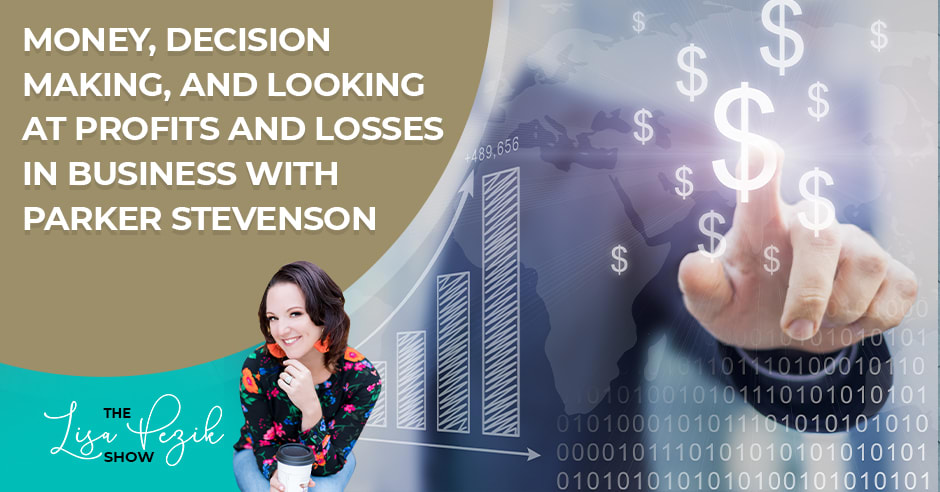
Entrepreneurs must step up to the additional responsibility of financial management, or else success will be elusive to them. Hiring accountants is definitely a huge help, but the final say will always fall to the business owner. Lisa Pezik is joined by Parker Stevenson, co-owner and the Chief Business Officer at Evolved Finance, who shares the right recipe for a money-making mindset that relies on data when making decisions. He explains the power of profit and loss statements in a company's future, particularly with expenditures and employee screenings. Parker also discusses how entrepreneurs must properly handle business scaling and the most important money metrics to be monitored at all times.
---
Watch the episode here:
Listen to the podcast here:
Money, Decision Making, And Looking At Profits And Losses In Business With Parker Stevenson
I am excited to have a first fellow Canadian here with me. I’m excited when I always get another Canadian here who is living in the US. Some of you know I'm an American that moved to Canada. We're role reversal here. We're talking about money. I don't know if I've ever shared with you that I don't manage any of the money in our business. My husband and I work together. I know how we get paid, we have an accountant, we pay the government, our books are clean, but I have no idea looking at data, analytics, and even our investments. We have a bajillion investments. I see the money coming out but I don't manage any of that, business-wise or personal-wise.
I will say I'm a little money-phobic. I bet business owners are nodding their head thinking the same thing that you know you're doing well, you know you're making money, but maybe it makes you feel a little weird or awkward because you don't know what you should be looking at. You don't know what you don't know and that's what this show is. It’s going to blow up this discussion to make you feel better about all of these things.
---
I've got Parker Stevenson here with me. Parker, welcome.
Lisa, thank you so much for having me. I'm excited to talk numbers with you.
I'm a little scared but I'm excited, too. Let me tell you about Parker, so you know who he is. He is a Co-owner and the Chief Business Officer at Evolved Finance. A bookkeeping firm that specializes in helping online entrepreneurs to build more profitable and financially stable online businesses. For years, Parker has been advising some of the top coaches, course creators, influencers, and thought leaders on how to make more sound business decisions using their financial data. Before joining Evolved Finance, Parker spent five years at Adidas America, where he became the US product manager for golf footwear.
I was a big golf nerd before my time in the online space. I always looked at my time at Adidas as my Master’s. It was like my MBA because I got to move up in the company quickly and had a lot of amazing opportunities but I also realized I didn't want other people telling me what to do, so I did something more entrepreneurial.
That's like the story of every entrepreneur. I used to joke and say, “I'm highly unemployable.” Someone would be like, “Don’t say that. You're not highly unemployable. You didn't like the way other people were doing things.” I was like, “That's a much better way of saying it. It's true.” Why are we money-phobic? Why do a lot of us shy away and go, “I don't want to look silly. I don't know my numbers?” What have you seen in your data why that happens to a lot of successful online business owners?
I've seen it in successful people. We'll have clients coming to us, they have healthy businesses, and they feel stressed out about it. It's a shame. I'm not a sociologist. I don't have deep studies in this but what I've seen firsthand is, number one, there's a crappy culture around money, especially in the United States. I can't speak for other countries, but it's so taboo. We were talking before about how there's that study done in the UK where they surveyed a bunch of people in England. The results they got said that these people would rather talk about their sex lives than talk about their money, which is revealing because there's nothing much more personal or intimate than your sex life. Finance and money are that much more intimate and feel much more taboo to talk about. I'm sure there are some roots in that in the US about why people don't talk about it.
The finance industry, in general, hasn't done any of us any favors. When it comes down to, especially corporate finance, Wall Street, or banking, some of that stuff gets complicated but then that's what we hear talked about. People are talking about corporate finances and they're talking about the stock market. For most of us, our eyes are rolling to the back of our heads because they're talking about such high-level stuff. Even for me, when I was in college and I was taking Accounting and Finance, I had no context for what I was learning. I never worked in a big corporation before. I barely knew how corporations even worked as it was. You're trying to learn something that I have zero experience next to.
If you don’t pay attention to what's going on financially in your businesses, chances are you're not going to be profitable by accident.
When you get into your finances, even your small business's finances, we still take some of this vocabulary and some of this understanding from, “Finance is scary and complicated.” The reality is our finances and our small business finance are so much more straightforward. It's so much easier. When you throw in like, “What do I need to know about taxes? What do I need to know about bookkeeping? Where do I need to know about tracking the money in my business?” These are the things that people in my industry, bookkeepers, accountants, and financial professionals get deep into their worlds and they forget there's this customer at the other end. There's this opportunity to educate them and teach them and not like, “Let me file the taxes and I’ll talk to you next year.”
We, at least, feel it of all finance that there's this huge opportunity to educate our clients. When we educate our clients, they go, “This isn't as difficult as I thought. You guys are doing the hard stuff by doing the bookkeeping.” What we're putting in front of our clients are the numbers and the data. They go, “This isn't hard at all. Why did I think it was?” We're also trying to educate our clients because we know they're capable of it and we know they're going to be better business owners because of it. We look at it a little differently than some of the other people in our industry. I would like to think that the majority of our clients would say they are far more comfortable with money. Also, far more confident with making business decisions because of this up-leveling of their finances they've gone through since working with us.
I love that education piece. That builds trust when someone is willing to say, “Here's what I'm doing. Here's why I'm doing this.” We do that in our business in branding, copywriting, design, coding, and funnel building. We do the same thing with the client. We're like, “Here's why we're doing this. Here's why you see it this way.” Even though we do it for them, it's done for you. We still educate them along the way because that builds trust, lowers their anxiety, and all those things you were talking about.
It makes them a better client, too. It makes them easier to work with. The client relationship is more enjoyable. They can even bring stuff to the table that might even help you guys because they understand what you're trying to accomplish more clearly.
As the online business owner, what do I need to know or what do I need to be looking at?
There are a couple of things that as business owners, we have to be aware of and we have to accept this is the game we're playing. Number one, we have to understand that we have an extra responsibility as business owners. If you wanted to have all the number stuff taken care of for you, then work for someone else because the taxes get taken out of your paycheck and you're done. As business owners, a lot of us go, “I want to sell. I want to market. I want to serve my customers.” All that stuff is awesome but if you don't want to have to learn new skillsets or understand different things you didn't have to deal with when you're working a job. Do all that sales and marketing for a company where they can pay you as an employee. Otherwise, as business owners, we have to accept that there's this extra responsibility.
If you're an employee working for someone else's business, which is fine, then you manage your household budget, “I make X amount of dollars each month. We spend X amount of dollars each month. Hopefully, we're putting some money in savings.” That's pretty easy but I know even for a lot of people, that's a lot for them. A lot of people still will ignore that part. If we throw in the fact that you still have to do that, now we have this business, this whole other entity that now has a financial life. We have to now manage that, too. We need to do it separately from our personal finances.
One of the first things we tell people, if you aren't doing so already, you should have a dedicated bank account, credit card, PayPal account, all that for your business, and then you'd have all your accounts personally. Keeping those two things separate is important. That's going to be part of this extra responsibility. Don't run everything out of one bank account, both personally and business-wise. We don't file taxes. I'm not promoting our tax service but everyone should have an accountant. We've had some clients that maybe had some rough spots in their businesses, have some credit card debt, or had to take out a business loan, but we've seen people dig out of that.

It's a lot harder, mentally. It sucks to have back taxes, owe the IRS, and the United States at least to owe the government money and getting behind on that. While you're paying that off, you still have to be playing catch up on the taxes you owe for the money you're making. The way we've seen businesses get in trouble with that is their aunt said, “I can file your taxes for you.” Their business partner said they could or their spouse said they could. None of these people have accounting degrees. They go, “I can figure it out.” The IRS comes back and goes, “You owe us a gazillion dollars more than what you said you did for the last three years.” You then get into a crappy situation.
It's your responsibility as the business owner to make sure we have the right people in the business to make sure the financial pieces being taken care of. Get an accountant as soon as you can. The last thing I like to touch upon here is that making money is where most entrepreneurs think that's what their financial responsibilities are and there's no question. I talk about this in a free workshop that we have on our website. Number one, we have to learn how to play game as entrepreneurs, which is to make money and revenue. That's what I'm sure you are good at helping people do. Lisa, you’re helping people drive more consistent revenue in their business. That's a huge accomplishment to figure that out.
When our clients come to us, what they've realized is, “I'm making consistent revenue but now there's this whole other thing that I wasn't expecting, which is how do I manage the revenue coming into my business effectively? That way, I have profit leftover.” For online businesses, profit is everything. That is the end-all, be-all metric for online businesses because most of our clients will never be able to sell their businesses. If they do, they're not going to sell for as much as a software startup, restaurant, or a more classic business. That's okay because if we're running profitable businesses, online businesses tend to be some of the most profitable businesses you could possibly be running that you can make lots of money. Each year, you make more money than you ever would have at another job.
That's fine if you never sell your business but that's why it's important that we start to take the financial part of our business seriously. If we're not paying attention to what's going on financially in our businesses, chances are you're not going to be profitable by accident. We eventually have to put some intention and focus into our numbers so we can make sure we have lots of money left over each month or each year so we can build our wealth off of our businesses. That's a lot more than you're expecting. Does that answer the question?
Yeah. It’s simple to hire an accountant. Get help. When my husband and I both opened our business, we had incredible success in the first 2 to 3 years. We were audited by the government because they were like, “We want to make sure.” I don't know if it's different in the US than it is in Canada but I was happy that we had an accountant that had every single thing detail and every point of sale in everything.
My husband was the one who figured it all out. They were asking for this file, this thing, and that thing. Our accountant had A to Z. Every single thing they needed, we passed with flying colors. Everything was legit and good. I was like, “Did we do something wrong?” My husband was like, “No. They randomly will do that sometimes in Canada to make sure of everything.” I couldn't imagine having to get all those files, do all those things, and have everything. It would have been a nightmare if it was like, “We can TurboTax this so we could figure this out on our own.”
You would have had to bring an accountant in for your audit anyways, they'd have to dig in, figure everything out, and it would have cost you a small fortune to get that figured out. There are two pieces to this financial aspect of your business. One of them is we need everything to be organized so your taxes can be filed effectively and accurately. Also, we're tracking that financial data every month. This is what bookkeeping does. Good bookkeeping is taking all the financial transactions in your business and organizing them in a way so your accountant can fire taxes easily. Knock on wood, if you were audited, you can get through an audit and all of the data is there. It's sitting there waiting to hand off to the accountant so they can show the government.
The bigger your business gets, the more you need data.
On the flip side, it's also this data sitting here waiting to be looked at to tell you what you need to be focusing on in your business. The numbers aren't just for taxes. It's also, “Are we profitable? Why are we profitable? Why aren't we profitable? Where are the areas of the business where we need to put attention to in order to get the business more profitable?” We all need feedback. Essentially, your profit and loss statement are the most popular report for any business to be looking at.
If you're looking at your profit and loss statement, it's going to give you all the feedback and all the information you need to know to see, “Do I need to adjust the way I'm running my business? Are there opportunities I can be jumping on?” This is the stuff that we have to start to embrace as business owners because the bigger your business gets, the more you need data, whether it's on the marketing side. You can run some launches and have some success but all of a sudden, if you want to start running ads or you want to have a more sophisticated funnel, you don't just build it and go, “Let's see what happens.” Test it and you have to get data. We see how many people are clicking. How many people are converting? How many people are opening up emails?
From a marketing standpoint, people seem to be more comfortable with that because there are no dollar signs in front of those numbers. The financial stuff is the same thing. It's the feedback that's letting us know. Are we making the right decisions in our business or not? That doesn't have to be scary. It doesn't have to be shameful. We need that data organized for us in a way that we can understand, interpret it, and then make the decisions on what to do next. You know your business better than anyone. You're likely going to understand what you need to do next. We need the right information to be making those decisions.
Before we got on, you were sharing some of the bigger names in the industry. I don't know if you want to share any of them on the show or not. It’s confidentiality. Let's say you are working with some well-established fantastic thought leaders, entrepreneurs, and everyone would know who these people are. Does it get more complicated as you reach that 7-figure or 8-figure and you're managing a lot of money for them? Is it bigger, scarier, and more complicated as you grow? Is it the same as someone who's making $200,000, $300,000, or their first six figures?
I like that you're asking that because I feel like so many times, people are like, “What are you seeing behind the scenes?” I don't think people realize what we see as bookkeepers in this space. I do think each level you're at has its unique challenges. A business that's making $200,000 a year might still be focusing a lot on like, “We're making sales but how do we do this more consistently?” Expenses might not be the issue.
There's a certain point where we can talk about some metrics that we look at in our client's businesses but it might be words like, “We're making 30% profit a year.” If you told me, “Can you look at my 30% profit $200,000 a year business? Where should I cut expenses?” Chances are, I wouldn't tell you to cut your expenses. You need to drive more revenue. The bigger your business gets, the easier it is to keep cashflow in a good place. As the business gets bigger, it can get more complex in the sense that there's more data to go through.
It's more complex from a bookkeeping standpoint. In terms of the business owner, they’re still focusing on the same two things. For online businesses, what's your cost for your leads? Usually, advertising is going to be the biggest expense. Team costs, that's going to be the other big expense. Depending on how your business is set up, labor might be bigger. Out of all the finance, we have no marketing. It's some referral fees that we give out to people who talk about us and send new business our way. It's not a big fee but we have huge labor costs because our whole service is people-driven. We have team members.
Our clients who are selling courses might have a ton of advertising because they need to be bringing new people into their offer every single month and selling it but they might be able to do that with a much smaller team than we would have for our business. This is where you have to understand where your business lies. From there, the businesses have to track their ad spend more. They have to be more aware of who they're hiring. What happens is, a lot of our clients who are getting to these higher seven-figure levels, it can happen fast. Online businesses can grow quickly that they go, “I'm making a lot of money.” They then start hiring people fast. This is where that panic hiring increases labor costs quickly. All of a sudden, they're like, “I'm making more money but there's not as much money left over.”
Sometimes, they need to pause and go, “How do we make sure we have the right systems and operations in place to make sure we're doing the work efficiently? Also, not hiring three people to do something that one person could do if the process was organized.” These are all things that you're like, “You're talking about operations. You're talking about marketing.” It all stems from the financial data. That starts to guide you around.
If you have huge labor expenses, that's telling us something about how our business operates and how we serve our customers. That's why as your business grows, you're still making the same decisions. It's bigger dollar amounts. We have to put more attention and focus into these parts of our business. You're also going to have more team members and more resources to help you manage this stuff more. It gets a little heavier as your business grows. At the same time, you have more support, more help, and more resources than you did when you were doing everything in a $200,000 a year business and you were the person that had to figure it all out yourself. There is some complexity as a business gets bigger. Also, certain things get a heck of a lot easier and it always seems to balance itself out.
I love everything you said, even the mindset and how the data drives decisions. Let the data drive decisions. I remember my mentor, Bo Eason, was sharing about how more is not always better when it comes to a team. When you think about the military, they need to go, and take out the head leader, they don't send in the 200-person Army. They have five SWAT team members that go in and get the job done. That's what he was saying. A lot of people get stressed out when they think about this panic hiring that you talked about, “I need to get more team. I need ten people.” You might only need two people if you have the right systems, strategies, and things in place.
I love that you're sharing that. Your financial data can help you drive making those decisions, looking at the trends, and you help your clients navigate all of that. I'm seeing this change in our industry, especially in the online space. It's transformational, the businesses that are around. It is still educational but it's not how-to information anymore. It's decision-making information. When you can help people make decisions, you are valuable. That's what gets you hired over the next bookkeeping company, over the next done-for-you course creator, online business creating company. I love that you're sharing about how the data can help you make those decisions when you're looking at your profit loss statement and all those things that you threw out.
Lisa, I want to add to that. We are trying to help our clients become better decision-makers. In this space, we've seen our clients do this where it's like, “Business coach, teach me the strategy and let me copy and paste it into my business.” There's a certain amount of that can be helpful. I was a musician when I was younger. When you start to learn an instrument, you learn how to play someone else's song, and you go, “This sounds cool. I'm learning new skills. I'm starting to understand what you did as a songwriter to write this song as I'm learning how to play it.”
Eventually, if you want to be successful, you have to learn how to write your own songs. You have to learn how to create on your own. Sometimes, a lot of business owners want everything to be copy-paste, “Let me copy-paste from everyone else and then my business will magically go.” There is a certain amount we have to dig in and understand our businesses more deeply than what our business coach told us to do.
We have a service. We do the bookkeeping every month but our goal is not for our clients to be asking us for every little decision they're trying to make. We're trying to show them, “This is the data. These are the areas you need to focus on. This is how you know things are good. This is how you know things aren't so good. Be the leader of your business and make decisions off this. If you need us, we're here. Otherwise, go do it.”

We have clients we’ve been working with for so long. They never show up to our group calls because they know what I'm going to say. They know what I'm going to tell them. They have the answer is already there but the reason they're able to have those answers is they have the data. If I came to you and I had a funnel, and I'm like, “I don't think my funnel is working well.” You go, “Let's take a look at the data and what's going on.” I go, “I don't have any of that.” How much are you going to be able to help me? Zero.
As business owners, we can't focus on the things that we like to do. It doesn’t mean we have to do a bunch of the stuff we don't like to do. We can hire people to do a good amount of that but we have to learn this ability to problem solve, be resilient, and trust. We can learn new skills to make sure that all the pieces in our business are connecting together. Data is going to be one of the main factors in helping you connect all those pieces together.
Right out of the gate, you were like, “You have to accept the responsibility that, as a business owner or entrepreneur, you need to be looking at, staying on top of, and having the right people but still knowing.” It's true. I remember when we first started, it's like, “We’ve got to pay the government X.” I'm like, “What? Why do we have to pay the government that?” My husband was like, “Remember when you got paid? You saw all the deductions. This went to this and that went to that. That's what this is.”
You have to do it now instead of your employer.
I'm like, “That makes sense.” It can be a real shift in thinking when you go from working a full-time job where you didn't have to ever look and think about any of that to now accepting responsibility as the business owner. What are some of those metrics that we should be paying attention to or if they're not working with you, they should be going back to their bookkeepers and saying, “Let's have a discussion about.”
Without going too deep into how we organize our profit and loss statements because so much of what we do is we organize our clients’ financial data that makes sense for online businesses. The metrics I'm providing are based on the fact that we're only working with online businesses, course creators, coaches, influencers, thought leaders, and all that good stuff, which a lot of your audience is. This is going to be specific for that. If you're in a different industry or whatever, it might be a little different.
What we're looking for all of our clients starts with profitability. We want our clients to be at 30% profitability or better. Does that mean if someone is at 24% profitability, their business is broken? No, but we know what the potential is. We know that they can be doing better not because we read it in some book or because a business coach told us that's what we should be saying. We've seen in the data, regularly, what an online business can achieve. That's where we start everything out that 30% profitability mark. The bottom of your profit and loss statement is going to show you what we have left after all your expenses are accounted for.
If you went all the way back to the top of your profit and loss statement, which is going to show you what you are bringing in for income, we typically like to see our clients have at least one offer generating at least half of their revenue. Honestly, I like to see it be more like 70% or even 80%, especially if you haven't hit the $500,000 mark. If you haven't even hit the $500,000 mark yet, I would say I'd even like to see one offer to be 80%, 90%, or 100%. We found that our clients who have a focused offering grow faster and their profit stays higher as well.
It's like the parents have been saying it and then the teacher says, “Mom, so-and-so is sad.” That's this moment right now. We’re the winner. You're right. You don't need seventeen different things. You need the one winning offer, the one winning funnel. I had to have that moment there because I'm like, “I'm down with everything you're saying.”
That doesn't mean if you have one main offer, you're only allowed to sell that one offer forever, especially when you're building a business. We don't have the time, energy, resources, and money to sell seven things to an audience. We have to be more focused than that. Indirectly, that helps our client’s communications and marketing messaging. It makes it clear to their target audience. It’s like, “This is the problem you solved. This is what you want me to buy to solve this problem. It makes all of this so simple.”
You know your business better than anyone. You're likely going to understand what you need to do next.
On the back end, when it comes to building out your team, building out your systems, getting your software in place, now everything is pointing towards this one offer. We don't have all these systems and people trying to support seven things that the expenses in the business tend to be lower as well. That helps that profitability quite a bit. If we go into the middle of the P&L where all your expenses would start to show up. There are two main expenses that we'd be worried about. We track a lot more for our clients. If we look at your profit and you're not at 30% profitability, we're going to go, “We need to make more money.” Sometimes, for our clients who are making $100,000 to $300,000 a year, that might be the answer.
Otherwise, the first two places I'm looking at is, what are our add expenses? Are they more than 30% of our total revenue? We found that if 30% of our client’s revenue or more than that is going to ads, it gets difficult for them to keep the profitability up. Now, all of a sudden, you're making $1 and $0.30, $0.40, $0.50 of each dollar is going to your ad spend, you're turning a profit but we're not turning enough of a profit to both cover all the rest of our operating expenses and still have some money left over as well. We could do a whole episode on strategies about that, Lisa, to improve that another time.
On the flip side, let's say the advertising is fine or the business doesn’t even spend any money on advertising, and they get a lot of organic leads and organic traffic. That is going to be a team. What we like to see is that the team expenses are less than 20% and we would consider any employees who are not the business owner and any contractors that are supporting the business. For bigger businesses that have more profit than can be as high as 25% or 30% or for instance, in Evolved Finance, we are a more true service-based business, so our labor costs are a lot higher. Service-based businesses would be more like 20% profit is what we should be aiming for.
As a heads up, the reason that we are comfortable with 20% for businesses like ours, service-based businesses, our businesses tend to be more sellable down the road. We straddle this line of being able to be pretty profitable. 20% is still a healthy profit. We also have businesses we could sell down the road versus our clients, especially if they're selling courses or something like that, we want them to be in that 30%, 40% profitability range or more because that means they're making good living year over year.
That's where a lot of our clients have to decide, do you want to have a big team so you don't have to work as much but you make less profit? Do you want to have a leaner team so that way, you're a little more active in the business but you're making a lot more profit? There's a happy medium between either one of those ranges. That's where you have to have this data to make the decision on what you want.
If you don't know what your profitability is, you don't know how much you're spending on your team. You don't know what you're spending on your ads each month and how all those things tie together. You're never going to feel like you can make these decisions. Once we walk our clients through their profit and loss statement and they see how money is flowing through their business, they go, “You guys are doing all the work and showing the data being put together.” If you can add and subtract, which I'm going to go out on a limb and assume everyone reading can add and subtract, this stuff isn't as complicated as people think. It needs to be organized properly.
That phobia where we started is why people don't have this data because they don't know what to ask. They don't know what to look for. Their bookkeeper isn't helping them. I can't tell you, being in lead generation is like the end of our funnel that we do for people. Almost every person is like, “What's your ad budget?” They're like, “What makes sense to you to spend? We know that we would love to spend for you to get you the result that you want but what's your budget?” “I don't have one.”
Even coming to us in general, like, “I want to build this course. I need a new website.” We’re like, “Fantastic.” We're always like, “We don't want you to have to sell your third child to be able to pay for us. What is your budget?” “I don't have one.” People don't even look at the money. They don't even know what is going to make sense for them in their business. I love that you're sharing that. It’s important to have these numbers and this data.
It makes it less stressful. You feel like, “I know what's going on in my business. I understand.” At the end of the day, these are profit machines. Money comes in and money goes out. If we completely ignore that, we're never going to learn how to make higher-level decisions in our business because we do not have the visibility. One of the things that we teach our clients is we want them to build up three months of operating expenses in their business. That way, if you have a bad month, if you want to have a budget to start running ads, we have cash available in this business to help it grow.
A lot of people take all the profit out of business to pay themselves. They're always walking on this tightrope and barely making enough money to get by each month. If they saw what was going on with their finances, they would make different decisions. I know they would because we see it all the time with our clients. This is something we teach in our workshop. If I gave you a car and said, “This is your new car. You're going to drive it everywhere but I've blocked out the dashboard. You have no idea what your speed limit is. You don’t know how fast you're going. You don't know how much gas you have. You don't know if the engine light or oil light is on, tire pressure.” Could you drive the car? Yeah, but it's going to be stressful as hell.
You're either going to be someone like me who's going to be super conservative and be at the gas station all the time guessing I need more gas. Taking it to the mechanic more often than I probably need to. You might be on the flip side where you're running this sucker into the ground and AAA is having to pick you up and tow you all the time. You're running out of gas on the side. You're breaking this machine down because you're not taking care of it. You don't know when you should be taking care of it.
That's the analogy I like to use in terms of running a business where your business might be running fine right now and it might be working. How long until it breaks down because we're not seeing, “When do I need to change the oil? When do I need to fill up with gas?” That's the piece as business owners we get so worried about. Do I know how to sell and market? Eventually, once you do that, selling and marketing aren’t going to be the only solution to your business growing. It's not the only thing we can focus on. We eventually have to start paying attention to what we're spending money on in our businesses as well.
That's important. That was a big thing. I love how you said having those three months available to you. My husband already had been in the entrepreneurial space before me. When I was leaving my nursing career, people were saying to me for so long, “You're making great money in your business. You don't even need to be a nurse anymore. Why are you doing this?” I was like, “I want X in the bank when I leave.” I feel like we do a major disservice when people are in that transition. It's like, “You're not a real entrepreneur if you're still working in your job while you're growing your business.” I'm like, “That's bad advice.” I've seen people quit their job because they didn't feel like a real entrepreneur. They're eating beans, rice, and they're broke as an entrepreneur in the first 2 or 3 months. I always say, “You never want to set up a business out of desperation because that is never going to work out for you.” To have that desperation of like, “I have to make money this month or my water bill is going to be shut off.” A business in desperation is the worst thing ever.
You're speaking my language, Lisa. I couldn't agree more. If there's one other piece of wisdom I could drop here from seeing our clients run their businesses as well as being a business owner as well, so much of entrepreneurship is risk management. Some people instinctively are managing their risk because that's the type of person they are. For me, risk management is there. There are other people who are foot down on the pedal, “If something happens, we'll worry about it when it happens.” There's a happy medium somewhere there but we do have to be thinking about what happens if things don't go exactly as I thought they would. Your launch doesn't go the way you thought. Your funnel breaks down for a month because Facebook changes the algorithm. What happens if a pandemic happens and we don't know what the heck is going to happen in the world?

I get it. A lot of mindset coaches and business coaches are like, “We got to be positive. We got to think about the future. You got to manifest.” All this stuff. You have to have a good attitude but there are tons of people running more successful businesses than anyone reading right now who are not positive, pessimists but are able to manage risk and know how to get things done in their business. They can still be successful. I'd rather be positive and happy while I'm growing my business.
If you need to keep working a job until your business becomes financially viable enough for you to live off the income of your business responsibly, great. Work your job. You have to understand what's my financial situation. Do I have enough of a runway that I can pay my bills personally if things don't go well? Is it a matter of, “I'm going to keep working my job but I'm going to build up X amount of dollars in the business so I can pay myself for six months while I get this thing fully going?”
Depending on what kind of entrepreneur you are, some people are like, “That harshes my buzz. I don't want to worry about that stuff.” If that's you, go for it. I don't think running an online business means we have to go into debt. It doesn't mean we have to sacrifice everything. There's a happy medium. There's a middle way with everything and it's up to you to figure out what's that middle for you. If we have insights into our personal finances, if we have insights into our business finances, managing risk becomes a heck of a lot easier than if you're flying blind and winging it every month.
Everyone loves that story of like, “I lived on my friend's couch and I had so much fun.” I'm like, “No. That screams like, ‘I losing sleep every night.’” That's one way to do it but you don't have to do it that way.
It’s the high-risk way to do it. It's a crapshoot. That's where a lot of Silicon Valley startups. You hear about Facebook, Google, and Uber where it completely pays off. For every Facebook or Google, there are tens of thousands of startups failing, people who risked a lot, and it didn't work out. Luckily, with online businesses, these are a lot less risky to run because you have a lot less overhead. You don't need investors. You don't need a lot of money upfront to get these businesses going.
For every Facebook or Google, there are tens of thousands of startups failing, people who risked a lot, and didn't work out.
I'd say a huge amount of our clients had part-time jobs, full-time jobs when they started their businesses, and they didn't dive in until the business was making enough money that they felt comfortable getting in there. If someone is telling you to quit it all, they're giving you advice they didn't follow. We have 150 recurring clients that we're doing bookkeeping for and almost every single one that I've talked to had some plan to transition. They didn't go into $30,000 in debt and go, “Let's figure it out. Let's wing it.” As entrepreneurs, it's a good time to learn how to use a little more strategy than that.
Parker, this was good. You broke it down. That was one of the things I remember. It was like, “Do you want to have Parker on?” I was like, “Yeah but I got to make sure that he can break it down to almost like those finance for dummies book.” Not that there we are dummies but in that frame of reference to be like, “If he comes in and starts talking over people's head, that's going to feed that fear, anxiety, denial, and we're not going to take that responsibility.” Thank you for breaking this down simply for all of us to be able to wrap our heads around and know what we need to do. It’s amazing. Did we miss anything? Any parting words or any other thing you want to share?
I get asked this and this is my go-to answer. I've been fortunate to get to see many amazing entrepreneurs grow businesses. I've developed friendships with their clients and watch these people go on wild journeys. Sometimes, when we look at other people's businesses, we think they have some secret that we don't have. They think, “There's something special about you and then there's nothing about me.”
I would say that so much of entrepreneurship and what I've seen with our client’s businesses is that resiliency. It's the desire to always be willing to solve problems no matter how hard they are and look at problems straight in the face and figure them out, not stick our heads in the sand depending on where you're at in your business and whatever level you want to get to. There's nothing special about the people who are already at the levels that you're at. They were willing to solve the problems, be resilient, and figure things out.
I can assure you, whatever level anyone is out in their business, they're trying to figure out how to get to the next level. They don't have all the answers. They're trying to work their way forward like you're at with your situation right now. We've seen so many small business owners change their lives simply by trying to build a business that's of service to others that provides value and is willing to learn the game of entrepreneurship. Learning these rules like, “What do I need to be responsible for as a business owner?” Many of our clients have proven that people with no finance degrees, no fancy Business Master's Degrees can go out, and run successful businesses because they're willing to learn and they're willing to solve problems.
Well said. I love that so much. I've got your Facebook, Instagram, Twitter, LinkedIn, and your website. I've got all sorts of ways that people can get connected with you. I know you're US-based even though you're Canadian. They can still reach out to you for your services, your help, and referrals. I love that you help people make decisions and you teach along the way. I think generous businesses like us are the ones that are going to get ahead because people trust us. We have no ulterior motive. We're going to tell them like it is. We're going to tell them the truth. We're going to help them feel good and make sound decisions.
Get results. That's ultimately what we want as business owners. If I'm working with someone, how are you going to help me get results I couldn't get myself? That's been the key to our success. I'm sure it's been a big key to your success as well.
Parker, thank you for being here with me. Readers, thank you for being here. I know that in this crazy time, we’re being pulled in 100 different directions. I want to honor you that you took the time to read this. Come back and take notes. Come back whenever you're getting that worry about, “I don't know if I'm managing my finances correctly or if I'm making the right business decisions.” What I love about podcasts is that once it's here and it's out, it's here for you to consume over and over again. Share it with other people if you find this helpful. Be sure to check out Parker on all his social links. Thanks again, Parker, for being here. We'll see you again next time.
Thanks, Lisa. Thank you, everyone.
Important Links:
- Facebook - Evolved Finance
- Instagram - Evolved Finance
- Twitter - Evolved Finance
- LinkedIn - Parker Stevenson
- https://EvolvedFinance.com/podcasts/
- Evolved Finance
- Free Workshop - Know Your Numbers Now! Finance Workshop
- Bo Eason
About Parker Stevenson
 Parker Stevenson is a co-owner and the Chief Business Officer at Evolved Finance; a bookkeeping firm that specializes in helping online entrepreneurs to build more profitable and financially stable online businesses.
Parker Stevenson is a co-owner and the Chief Business Officer at Evolved Finance; a bookkeeping firm that specializes in helping online entrepreneurs to build more profitable and financially stable online businesses.
For over 6 years, Parker has been advising some of the top coaches, course creators, influencers, and thought leaders on how to make more sound business decisions using their financial data. Before joining Evolved Finance, Parker spent five years at Adidas America where he became the US product manager for golf footwear.




